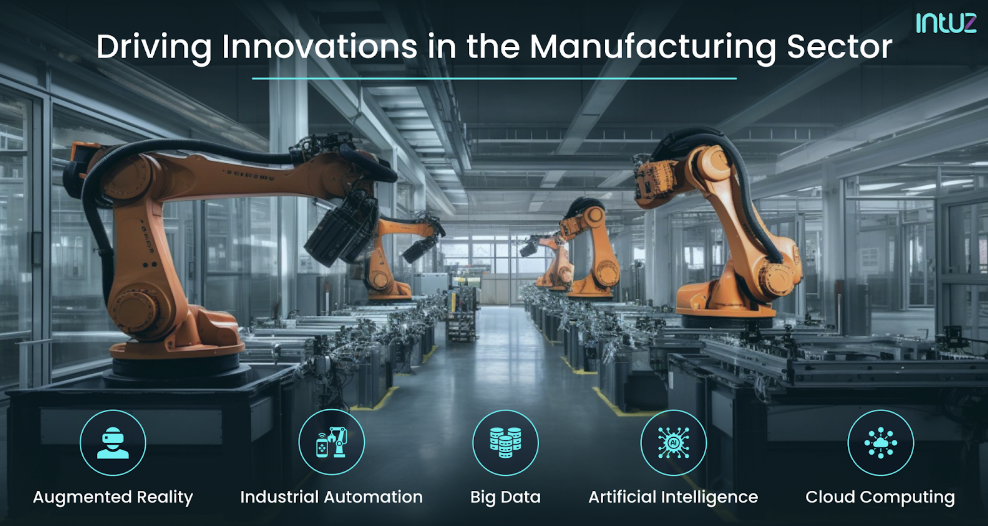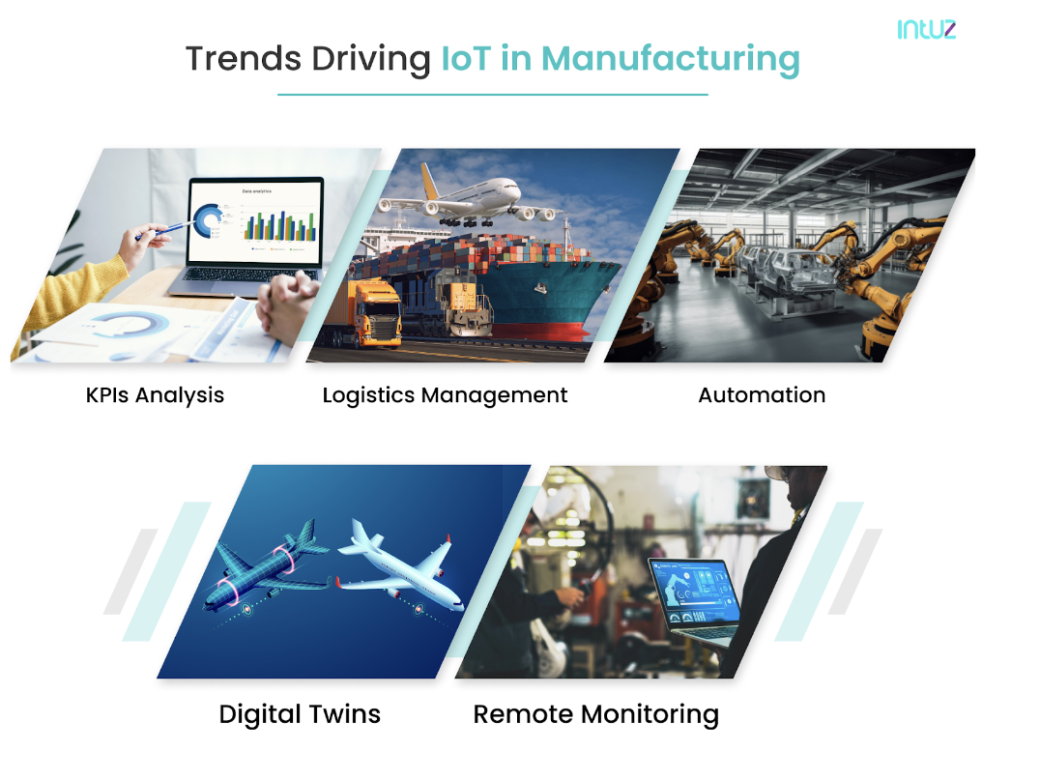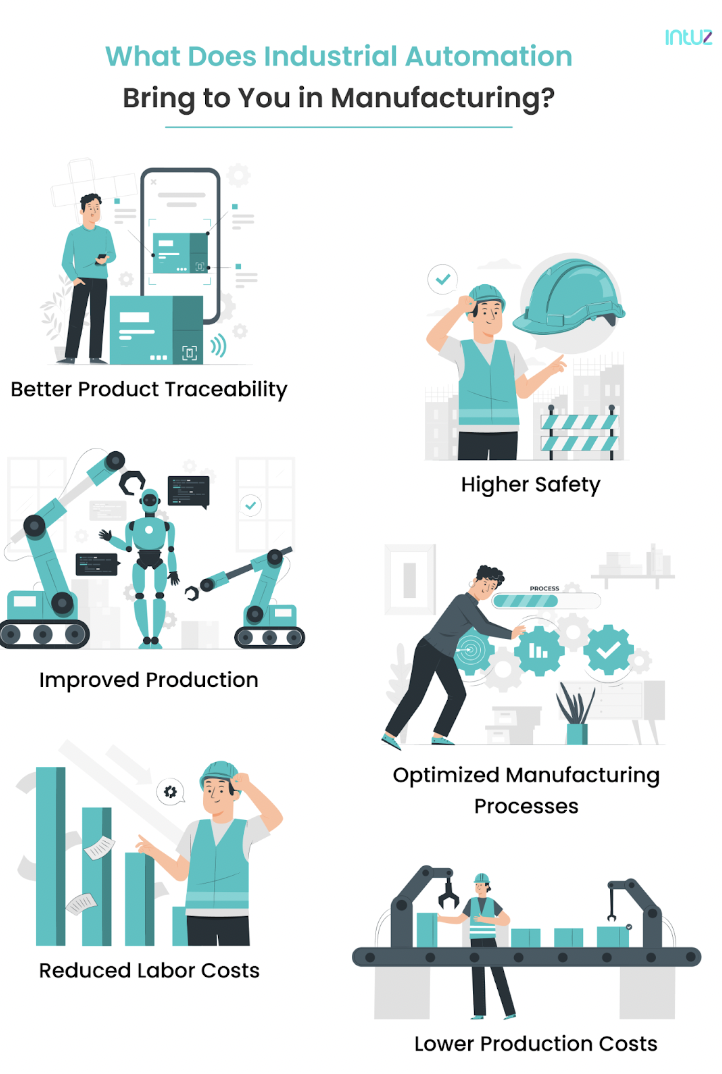IoT in Manufacturing: How IoT is Driving Innovations

IoT in Manufacturing: How IoT is Driving Innovations
The global manufacturing industry has been through a digital transition lately, expected to bring about a new era of smarter and more convenient manufacturing practices. Several influential factors associated with the smart digital transition are changing manufacturing norms to facilitate maximum growth. This blog discusses the perks that the digital transition will bring in the context of IoT integration.
Being an insider in the manufacturing sector, there’s no way you can remain ignorant of the arrival of Industry 4.0. Following the footprints of other sectors, the manufacturing sector is also transiting through digitization, and the trend will continue.
Innovation is the mandate for an industry to thrive. The inclusion of smart tech in the manufacturing sector indicates that the sector will warmly welcome IoT-based solutions very soon.
IoT is relevant for the manufacturing sector, where all processes rely heavily on manpower. IoT-integrated operations will lead the manufacturing sector on a path of improvement, both statistically and operationally. How? Read the blog to find the answer.
How is the Manufacturing Marketplace Evolving?
With the global population reaching the 8 billion mark, the manufacturing marketplace is expected to grow even bigger, surpassing the high growth ratios of the previous years. The manufacturing industry requires smarter technology to meet its evolving needs.
Manufacturing experts suggest digitizing a large portion of manufacturing processes. That’s because they think that manpower won’t suffice in terms of ensuring a healthy manufacturing demand and supply ratio in the near future.
The global manufacturing sector had an exceptional growth rate of 3.9% in 2022, and the figure projects a stunning industry expansion shortly. But that’s only possible with the involvement of smart tech in the sector.
From all the facts and figures acquired from different sources, the future manufacturing marketplaces will be heavily data-driven. Also, most manufacturing processes will rely on automation and AI in the coming days.

How Does the IoT Fit in Today’s Manufacturing Sector?
Like other industries, the manufacturing sector has undergone contemporary transformations, and it currently demands the integration of IoT into it. The manufacturing sector is mostly driven by manpower. IoT-based solutions minimize the need for human intervention in manufacturing processes by introducing smart technology.
Companies in this sector must bear massive losses due to untrained workers, equipment failures, logistics issues, process monitoring difficulties, and many more. Despite concurrent tech integration into the sector, the shortcomings are partially resolved. IoT gives you a better grip on your company's manufacturing process and logistics by enabling you to screen them constantly. Also, the smart features of the IoT predict equipment downtimes and analyze production analytics to ease your load.
Though many of the big names in the global manufacturing sector are in dilemmas about IoT-integrated processes, the annual growth rate of the IoT market in the manufacturing industry has touched 11.9%. This percentage confirms that IoT is not yet being introduced in the manufacturing sector, but rather it’s occupying the sector at a tremendous pace.
How IoT Improves the Efficiency of Manufacturing Processes?
Early-on Prediction for Equipment Malfunctions
The functions of your company’s internal manufacturing units just collapse as the equipment goes out of service, and you have to bear massive financial losses due to that. IoT gets you out of such traumatizing situations by analyzing the possibility of equipment malfunctions and updating you accordingly.
The smart tech behind an IoT-based manufacturing process even diagnoses whether a device is underperforming. By providing you with analytical predictions on the possibility of equipment malfunctions, the IoT gives you time to prepare for such situations. Also, you can repair and maintain the impaired manufacturing devices before they completely collapse.
Effective Asset Management
It’s quite hectic to keep the entire manufacturing flow under your radar and manage the manufacturing assets simultaneously. Fortunately, IoT appears as a savior here too. IoT provides you with customer-centric asset management tools that are proficient in managing manufacturing assets and keeping them optimal. You can leave asset-management prompts for your team on the go even when you’re not physically present in the factory.
Implementation of Operational Intelligence in Real-Time
You want your production units to work at their highest capacity. You get a real-time operational intelligence facility as you shift to an IoT-based manufacturing infrastructure. You can obtain end-to-end insight into your factory’s operations using operational intelligence tools. That way, you can scale up your brand by increasing production efficiency.
Analytics-Based Production Planning and Process Scheduling
IoT-based production systems don’t even require you to be involved in production planning and process scheduling all the time. Such a production system eventually adapts to the ongoing needs of your business and supports you with analytics-based planning and scheduling prompts. With that, you don’t need to brainstorm all the time to plan and schedule production procedures.
5 Trends Driving IoT in Manufacturing

Digital Twins
Digital twins, an inseparable part of the IoT, uplift your chances of thriving in manufacturing. How? Digital twins are highly recommended for production accuracy, and this advanced technology significantly decreases production waste volume.
Integrating digital twins into your manufacturing process also helps you determine the conditions of your machinery and the maintenance or optimization they require.
Logistics Management
IoT-based manufacturing processes also include smart logistics management tools that screen logistics end-to-end. Such tools cover the entire inventory acquisition, storage, and transportation processes, saving you much time.
Automation
Once you incorporate IoT into your manufacturing process, every aspect of the process will become convenient and effortless. More than that, the entire process will become automated and require little to no human effort.
Remote Monitoring
Remote monitoring is the essence of IoT. This smart feature lets you control the manufacturing operations of your factory from wherever you are, whenever you want.
KPIs Analysis
You won’t even have to spend extra time and effort on KPI analysis because that also gets automated with the analytical tools that come with IoT services.
What Does Industrial Automation Bring to Manufacturing?

Reduced labor costs
IoT equipment keeps manual labor minimal to make sure that manufacturing operations remain uninterrupted even when you don’t have adequate manpower. You should leverage this side of IoT-based operations to minimize labor costs. Eventually, that leaves you with the option of investing the saved resources into other aspects of your business.
Improved Production
IoT-integrated manufacturing units guarantee decent production quality regardless of what other parameters say. Once you incorporate IoT-based applications into the manufacturing practices of your company, you’re never going to experience a deterioration in production quality. This also paves the way for better customer satisfaction and a higher customer retention rate.
Optimized Manufacturing Processes
Contemporizing your business’s manufacturing process is a necessity to ensure long-term sustenance. IoT-based manufacturing units alert you of the optimization requirements in your brand’s manufacturing process so that you don’t fall behind.
Better Product Traceability
IoT-based manufacturing infrastructures also make it seamless to keep track of products and stocks. Utilizing the smart automation features offered by IoT-based tools, you can keep a tab on the production rate and monitor your production units consistently.
Higher Safety
Safety is another important reason to shift to IoT-oriented manufacturing. Such an internet-based infrastructure enables you to monitor the production procedures of your company even in your absence.
Lower Production Costs
IoT-based manufacturing operations also endorse decent production volumes at marginal costs. Higher production costs consume a large percentage of your resources, which is not expected. As you bring down the production cost to a marginal level, your revenue margin naturally goes upward.
IoT is the Future of Manufacturing
From increased production volume to optimized manufacturing, IoT will alter all conventional practices for the better with its smart touch. As a part of the ever-growing manufacturing sector, it’s your responsibility to contribute to the sector's further growth, and that’s possible only with the smart tech that IoT introduces.
Connect with an IoT development company on The Manifest.
